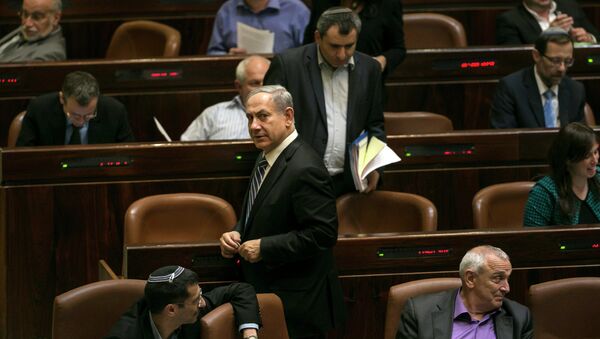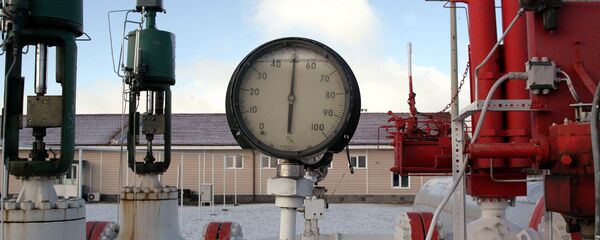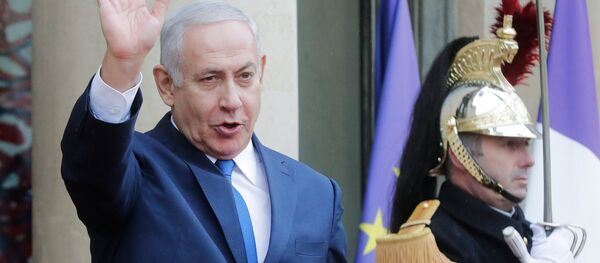The resignation has not deprived Israeli Prime Minister Benjamin Netanyahu of the parliamentary majority's support, but reduced the ruling coalition to 61 seats in the 120-seat Knesset. In turn, Lieberman has insisted that an early parliamentary election should be held in the country as soon as possible.
Sputnik spoke to Rami Zeedan, PhD Assistant Professor of the Israel Studies Program at The University of Kansas for more insight on the issue.
Sputnik: Israel’s Minister of Defence Avigdor Lieberman's surprise resignation has sparked concern that Israeli elections could be happening soon. How likely is that?
Rami Zeedan: It’s very likely. Lieberman is a powerful leader of the Yisrael Beiteinu party, which holds five seats in the Knesset. Following his resignation, his party officially left the coalition.
For all of that, it is more likely that the current government won’t be able to remain stable and hold power until the next scheduled elections in November 2019.
Sputnik: In general how important is the timing of the elections?
Rami Zeedan: The timing of elections in Israel is very critical.
For the current cycle, however, it is even more critical. PM Netanyahu has been under multiple corruption investigations. The Attorney General is expected to decide on indictments. Some claim that Netanyahu prefers to schedule the elections after the decision is made by the Attorney General.
Sputnik: No Israeli government has finished a full four-year term since 1988. Why is that?
Rami Zeedan: Since 1949, Israel had 20 legislative election cycles. In comparison, in Israel’s 70 years there have been 34 governments. This symbolizes the unstable state of e Israeli political system.
As a result, there’s a high fragmentation of the Israeli political system between many parties. It’s an average of about 12 parties that are represented in the Knesset.
In the past 30 years, the political divide has widened, which resulted in small or medium parties, but no large parties. This affected the stability of coalitions that are now based on small parties that can decide whether a government is overthrown.
Sputnik: Lieberman’s departure comes as protest to what he called ‘Israel’s too soft approach on Hamas’. How much public support is there on his stance on Hamas?
Rami Zeedan: As far as I see, by following the media and public opinion surveys, there’s a wide acceptance among Israelis that Netanyahu was not recently dealing right with the threat of Hamas.
Lieberman’s statement on Israel’s too soft approach is reflecting the thought of many Israelis. Especially the transfer for Qatari money to Hamas was seen as a wrong message that terrorism pays.
Sputnik: Benjamin Netanyahu’s recent approval of a cease-fire with Hamas has sparked talk that he was attempting to woo the left-wing. Is that the case? If so then why?
They prefer to manage the conflict with as less as possible casualties and as much as possible gains, but they don’t want to compromise and reach a possible solution to the conflict.
Sputnik: How can early elections influence Prime Minister Netanyahu’s position? Can he remain in power?
Rami Zeedan: Prediction of Israel’s election is a tough call. Even pre-election polls and exit-polls in Israel has not proven accurate in the past. So I don’t have an answer to your question.
All options are possible. There’re many new political figures and new political parties who are considering to run for office the next elections. This complicates the prediction even more. In any case, I think that Netanyahu will be closer to lose power when and if he will be indicted on corruption charges.
Sputnik: In your view, who can replace Benjamin Netanyahu’s as Prime Minister?
Rami Zeedan: There are many Israeli politicians who are qualified to replace him, from the right, the center, and the left. The only question is which one of them will be able to form a coalition after Election Day.
Views and opinions expressed in this article are those of Rami Zeedan and do not necessarily reflect those of Sputnik.






